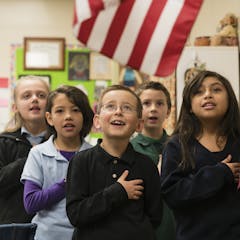
Articles sur K-12 education
Affichage de 21 à 40 de 375 articles

Drexel researchers evaluated a 2014 program implemented by Kevin Bethel when he was deputy police commissioner that led to fewer arrests of students in schools.

Teachers use tougher language when describing the misbehavior of Black children, new research shows.

Does Louisiana’s requirement for public schools to post ‘In God We Trust’ in all classrooms violate the doctrine of separation of church and state? A legal scholar weighs in.

Despite their scarcity, science fiction books are highly sought after by elementary school students.

Year after year, public schools have come up short on STEM teachers. An education policy scholar pushes for a novel solution.

A former physics teacher says America could lose its technological edge if it doesn’t do a better job of teaching quantum information science – starting in high school.

A veteran education researcher raises questions about whether educational research is actually being put to use.

The same boldness that enabled hip-hop to endure can benefit teachers in the classroom, a hip-hop scholar writes.

While a Florida curriculum implies that enslaved Africans ‘benefited’ from skills acquired through slavery, history shows they brought knowledge and skills to the US that predate their captivity.

A math professor explains how he prepares future teachers to use poetry in their math instruction.

A project to upgrade a high school playing field led to a book on how to inspire more young people to pursue careers as urban planners.

Tactics used to censor the teaching of American history in Florida schools bear much in common with those seen in the illiberal democracies of Israel, Turkey, Russia and Poland.

Twelve states do not require sex education of any kind.

The controversial – and often misunderstood – extracurricular groups tend to raise controversy. But under equal access laws, schools can’t discriminate against a club based on its point of view.

Scholars examine how state laws that restrict lessons on race could affect students and educators.

Many students say they aren’t learning much about slavery beyond its harsh conditions. A historian explores how Juneteenth offers opportunities to change that reality.

Schools are blocking access to ChatGPT on their computers to try to prevent students from cheating. Two experts on academic cheating offer a very different strategy.

A history scholar sees leeway and loopholes in a wave of new state laws that seek to control what teachers can say about racism in America’s past.

The road to becoming a champion speller is made easier with support from family and friends, but ultimately it depends on an individual student’s commitment to learning, a scholar writes.

Integrated computing enables teachers to incorporate basic programming skills into K-12 students’ regular math, science and language arts classes.
